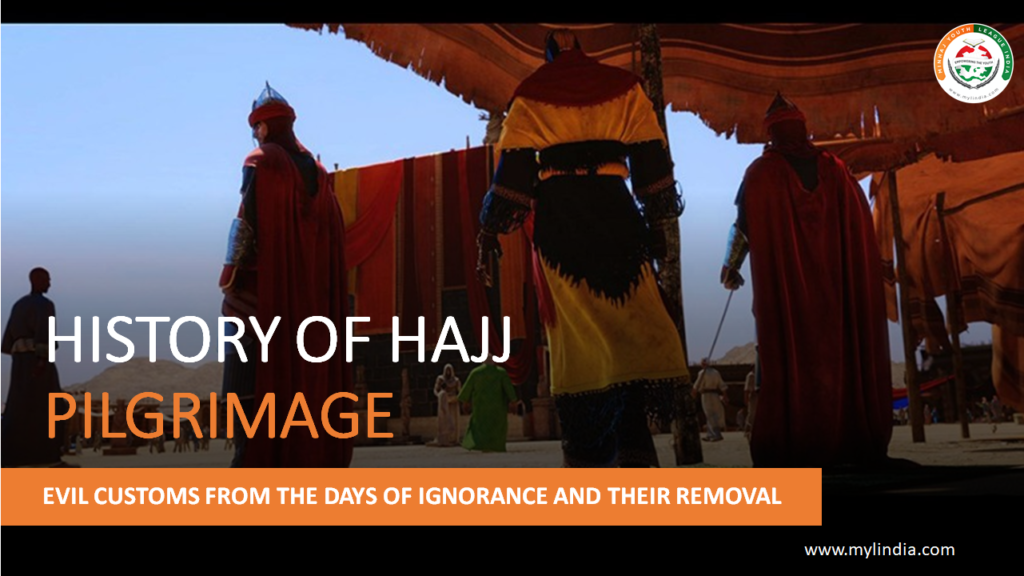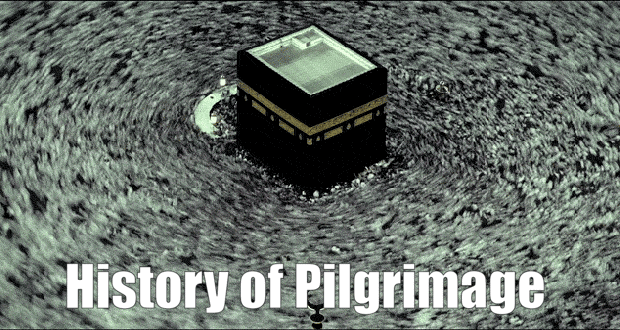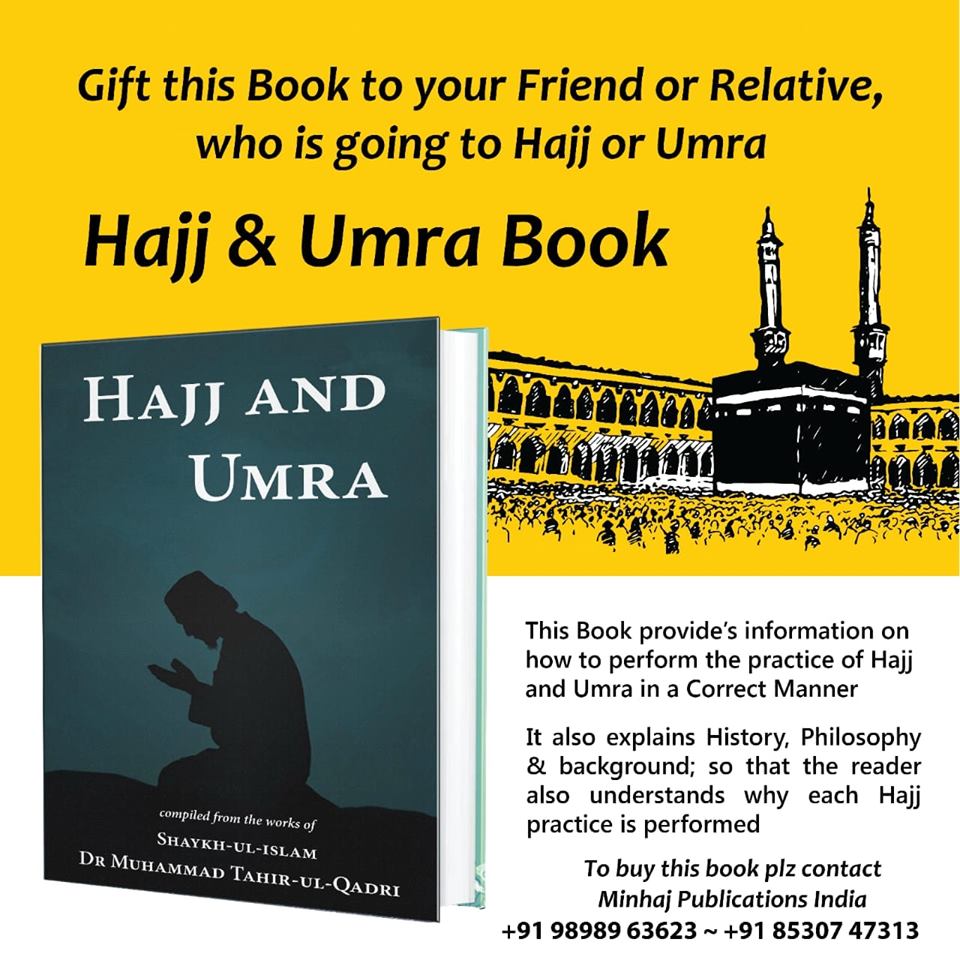Hajj History: Evil customs of Days of Ignorance and their removal
Q. During the Age of Ignorance, what distortions were made to the (Abrahamic) rites of Pilgrimage?
A: By studying history, it can clearly be understood that the Pilgrimage began about 3000 years ago. It continued in some shape or form until the time of the Holy Prophet (peace be upon him). However, with the passage of time, the Pilgrimage which was laid down by Prophet Ibrahim (AS) came to be modified and changed. The whole format began to change after continuous modifications until it came to a point where it was reduced to baseless rituals that were totally contradictory to the teachings of Prophet Ibrahim (AS). The Quran has mentioned these modifications many times.
One of the customs that the Arabs of that period had specifically adopted was related to the ihram. When the Arabs had worn the ihram with the intention of performing the Pilgrimage, they believed that it was forbidden for them to enter their homes from the front doors; instead they would enter their homes by jumping over the back walls, or entering through the rear window or skylight. This is what they used to consider as being among the rites of Pilgrimage. The Quran categorically states that there is no reward for such absurd customs. Almighty Allah states:
And it is not righteousness that you enter your houses from the rear (whilst in ihram—the sacred dress for Hajj). In fact, righteousness is doing pious acts (instead of observing such meaningless customs)
[Surah Al-Baqarah Chapter 2: Verse 189]
In light of this verse, righteousness according to Allah is Godwariness (taqwa). Jumping over the rear walls of one’s home can be categorised as superstition, not piety or righteousness. By clarifying what the essence of piety is, the Quran has put an end to such useless rituals and customs. Another custom practiced by the Arabs from the Age of Ignorance was their conjecture that the Pilgrimage (Hajj) and Visitation (Umra) could not be performed together in one journey. They used to make separate journeys for them both. This created exceptional difficulty for those who came from afar. Islam abrogated this concocted custom and allowed people to combine the Pilgrimage and Visitation in a single journey.
The Quran states: So, he who performs Hajj (Pilgrimage) or Umra (Visitation) to the House of Allah, there is no sin on him if he ambulates (i.e., walks up and down between) the two.
[Surah Al-Baqarah Chapter 2: Verse 158]
Another of their customs was that they used to prevent themselves from taking any provisions with them on their journey to Mecca. When they used to set off for the Pilgrimage, they would not take food, water or other item of need, as they falsely presumed this negated piety. Allah exposed this baseless assumption.It is important to bear in mind that Allah, the All-Knowing, is fully aware of all issues faced by man and He will never allow such self-imposed restrictions made on the basis of deviance to continue. So, Allah commanded those who set out for Pilgrimage to take adequate provisions along with them. Then Allah states that the best provision is Godwariness, as other provisions are temporal.

Q How were nudity, immorality and evil customs expelled from the Pilgrimage?
A: During the Age of Ignorance, the pagan Arabs used to circumambulate the Kaaba unclothed whilst whistling and clapping their hands—this used to be considered by them as an act of worship.
The Quran mentions this offensive behaviour:
And their (so-called) Prayer at the House of Allah (Kaba) is nothing more than whistling and clapping hands.
[Surah Anfal Chapter 8: Verse 35]
As Islam is a religion of nature, it is straight forward in its practices. Islam freed mankind from the inconveniences and burdensome rituals imposed by the Pagans. Historically, the format of the Pilgrimage that exists today took shape from the Pilgrimage which was performed a year after the Conquest of Mecca in the 9th year of Hijra, under the leadership of Hadrat Abu Bakr(RA). It must be noted that the Conquest of Mecca was in the 8th year of Hijra. in the 9 th year of Hijra, the Holy Prophet specifically appointed Abu Bakr(RA) as the head of a delegation consisting of senior Companions and sent them to Mecca. The delegation had already set off when the verses of Sura al-Tawba were revealed which detailed the rites of Pilgrimage bringing an end to the abhorrent custom of the Age of Ignorance that had distorted the Pilgrimage as a whole. When those verses were revealed, the Prophet(peace be upon him) dispatched Hadrat Ali(RA) as his envoy to go and deliver this message. When he caught up to them, Hadrat Ali(RA) conveyed the Prophet(peace be upon him)’s message to the pilgrims. He then delivered the Pilgrimage sermon which forever put an end to the customs and rituals of the Age of Ignorance.
The books of history relate that the Pilgrimage of this year was performed in two ways: the pagan Arabs performed their Pilgrimage according to their ancestral rituals and customs and the Muslims performed it according to the laws set down by Allah and His Prophet(peace be upon him).

The Prophet(peace be upon him)’s command was also announced that on this historic occasion the disbelievers and pagans will no longer be permitted to enter the Holy Sanctuary to perform the Pilgrimage. Thus prior to the Pilgrimage of the following year, the precincts of the Kaaba became purified of all traces of paganism. In this way, the Holy Prophet(peace be upon him) according to the will of Allah eradicated all deviated customs and rituals from the Pilgrimage, which were remnants of the Age of Ignorance.
Based on Teaching of Islam Series by Shaykh ul Islam Dr. Tahir ul Qadri



